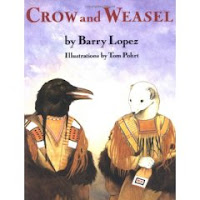This is a really deep book. It is a Native American tale of two young men emerging into manhood. Crow and Weasel are sent on an exploring adventure for the sake of their community, going further north than any of their people had ever been. As they are sent out they are reminded of the values of their community and the importance of representing their community well. Along the way they ponder and experience many valuable lessons. One person they met along he way said to them:
“I can see that. But you are beginning to sense your responsibilities, too, and the journey you have chosen is a hard one. If you keep going, one day you will be men. You will have families.” (p. 60)
One friend made a powerful statement about the value and importance of stories, not simply referring to stories in general but to the stories of your own community.
“The stories people tell have a way of taking care of them. If stories come to you, care for them. And learn to give them away where they are needed. Sometimes a person needs a story more than food to stay alive. That is why we put these stories in each other’s memory. This is how people care for themselves. One day you will be good storytellers. Never forget these obligations.” (p. 60)
While this is couched in general terms, and the characters pray to “the Above Ones”, this story (even more so than Greek mythology) can easily be used to point to Biblical truths. The importance of community, real friendship, thankfulness, appreciating the variety of gifts, and the importance of cherishing and passing down our story are all truths we need to stress more often. For a Christian, the formative story of life is the grand narrative of the Bible (which is composed of many compelling stories). In our culture we often fail to appreciate the power of these stories to shape our imagination, to empower life, etc. Then, our families must also pass down our particular stories of what God has done in our own families. There is much here for profound contemplation.
This leads to one downside of the book. It is depth often requires more reflection and awareness than younger children will be prepared for. My boys (10, 9, 7 years old) enjoyed the adventure, but would say they did not always get it. I think this would be a really good book to read with highschool or even college young men to use it as a springboard to discuss moving to the role of manhood.
I close with another great quote, with which I resonate- the value and importance of the everyday, relationships, and the local:
In the silence that followed, Weasel said very softly, “It is good to be alive. To have friends, to have a family, to have children, to live in a particular place. These relationships are sacred.” (p. 79)
